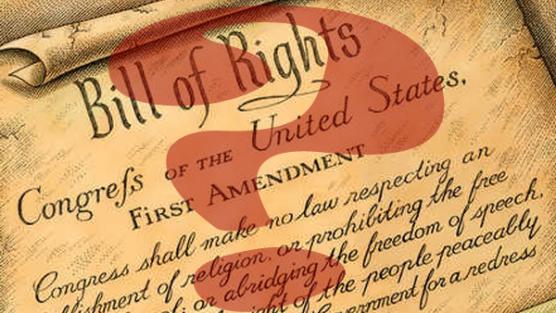The firestorm surrounding remarks tweeted by the Creative Writing professor at Fresno State, Randa Jarrar, speaks to multiple issues in our current society. As the debates regarding “what should be done” about her hateful words directed at Barbara Bush (specifically) and the Bush family (as a whole) fly across the Internet, our First Amendment right to the freedom of speech is once again being publically argued.
Many (it seems) in this current culture, believe that the First Amendment affords us the right to “say anything we want . . . about anyone we want . . . at any time we want” without any repercussions or consequences. But is this what the First Amendment really guarantees us as U.S. citizens?
Here is the actual text of the First Amendment: “Congress shall make no law respecting an establishment of religion, or prohibiting the free exercise thereof; or abridging the freedom of speech, or of the press; or the right of the people peaceably to assemble, and to petition the Government for a redress of grievances.”
Some historical context is important here, to appreciate why “the freedom of speech” was included in the First Amendment. One of the common practices of the King of England at that time was to imprison, or otherwise punish, anyone he considered a political dissenter. And the term “political dissenter” was used to describe anyone whom the King found to be objectionable to him because of what they said or wrote (both in public and private). As well as a tool to silence any political opponents, this practice often led to the unjust imprisonment of preachers, newspaper writers, lawyers, and anyone else who was found to speak against any practice of the King or the country. Although this is still practiced in many countries around the world today, our founders realized that one of the cornerstones of freedom was the ability to speak freely without fear of the government penalizing them.
So, are there any limits on this First Amendment? Our legal system definitely recognizes certain limits on the freedom of speech, particularly when it conflicts with the rights and freedoms of others, such as in the cases of libel, slander, hate speech, pornography, obscenity, false testimony, fighting words, and intellectual property. Justifications for limitations to freedom of speech often reference the "harm principle" or the "offense principle." Limitations to freedom of speech may occur through legal sanction or social disapprobation, or both. And certain public institutions may also enact policies restricting the freedom of speech, for example speech codes at state schools.
So then, back to the core question . . . are we really allowed to “say anything we want . . . about anyone we want . . . at any time we want” without any repercussions or consequences whatsoever? The answer to this seems to be an obvious “no.” What the First Amendment does protect us from is being punished – unjustly – by our government for expressing opposition to any practice and/or policies of the government. I can publically speak out against anything and everything my government does, practices, or puts into law. I can stand on the street corner, sign in hand, and declare my absolute disgust for any elected political representative without fear of retribution from them. I can write a scathing article about why I don’t like what my government is doing in another country, and distribute it in a newspaper, magazine, hand-out pamphlet, or on the Internet, and never worry about being penalized for it.
But, should I choose to stand up on my desk at the office and yell personal insults toward my boss, do I get to use my First Amendment right of “the freedom of speech” to protect me from being fired for that outburst? Of course not. If I take this tirade out on the street corner in front of the company I work for – where I’m NOT in the office – do I then get to use “the freedom of speech” to keep from getting fired for inappropriate behavior because I’m in public? I doubt it.
So then, why the outrage over the fact that a public university (that thrives off the collective reputation of its staff for donations from private citizens, businesses, and foundations) is considering taking internal action against an employee (to whom they pay a 6-figure salary) for making remarks in public that undermine that reputation? Is it because it’s a “public” institution? If that’s the case, then isn’t she getting paid with taxpayer monies? And if so, why don’t the taxpayers of California get to vote on whether or not any action should be taken? Or, perhaps, the school’s alumni and donors (whose monies are also footing part of her salary) should get to weigh in on how she be dealt with? As it is, lawyers on both sides are already posturing for a legal fight, depending on how the university chooses to deal with this.
But let’s look a little closer at the actual details involved in her outburst. Were her words directed toward the U.S. government – its policies, practices, or laws? No. Were these remarks directed toward a sitting politician or public representative? No. Do the phrases “smart and amazing racist,” “raised a war criminal,” “happy the witch is dead” and “can’t wait for the rest of her family to fall to their demise the way 1.5 million Iraqis have” read like anything other than personal attacks directed toward individual citizens (and their family members)? They do not. Is the professor entitled to her opinion? Beyond a shadow of a doubt. Was the choice to share these opinions about a private citizen - immediately upon their death - socially acceptable within the context of our culture? Public opinion appears to be leaning toward “no.” Is her belief that being “tenured” entitles her to some kind of immunity from accountability by her employer correct? Not if she’s relying on the First Amendment.
And that’s the “rub” – the First Amendment is there to insure that the U.S. Government, or any representative of that government, cannot unjustly punish U.S. citizens for voicing any grievances they have with that government. What it does NOT do is protect private citizens from being held accountable to the rules, regulations, policies, guidelines, values, or codes of conduct that their employers may set forth. And let’s not pretend that public universities (especially in today’s litigious culture) don’t bend over backwards to insure that potential employees aren’t made aware of those types of policies prior to hiring them. Remember, “Employment” is a contract between an employer and a worker, in which specific compensation is guaranteed in return for a specific task being completed. And depending on what that task is, the worker may be held to certain requirements relative to time-tables, workmanship, working hours, and behaviors that must be adhered to. So, if there are any “codes of conduct” that Fresno State University has in place, you can rest assured that this tenured professor was well aware of them.
If you happen to agree with this professors remarks (and their timing), you are welcome to defend her openly to those around you – that is a privilege afforded you by this country. If you believe her remarks were egregious and reprehensible you can certainly argue your point with anyone who will listen. But in terms of how her employer decides to handle the situation, let’s not pretend that her right to "the freedom of speech" is what’s at stake here. It is not. And in these situations, it never will be. She was not speaking out against any policy, practice, law, or representative of the U.S. Government. If she had been, no one would have blinked an eye! No, she specifically targeted a private citizen (immediately after their death) as well as their family. And the First Amendment does NOT give any of us the right to "say anything we want . . . about anyone we want . . . at any time we want" without any repercussions or consequences.
















